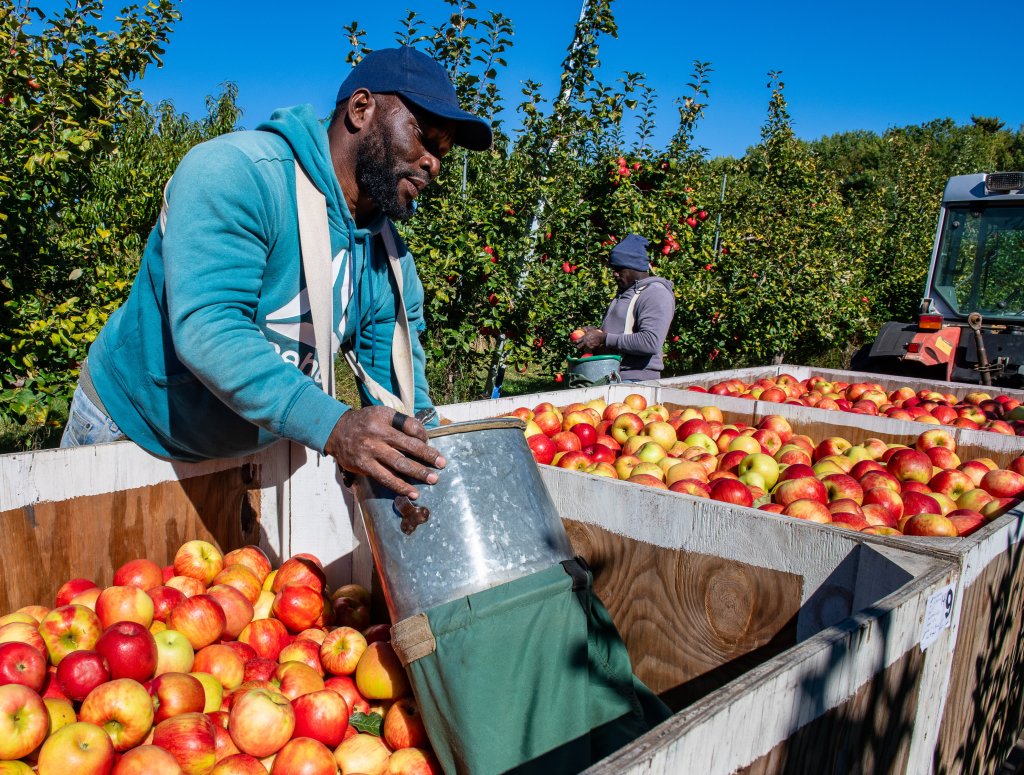
On a year like this, with apple yields drying up amidst Maine’s deepening drought, apple grower Sam Ricker is grateful for New England’s love affair with apple cider doughnuts, hard cider and selfies shot in picturesque orchards.
The eighth-generation grower said it will be doughnuts and diversification that will help Ricker Hill Farm and his family’s three-county apple empire survive the severe drought that is sucking the profits out of Maine’s small but scrappy agricultural sector.
“Retail doughnut sales surpassed u-pick sales a couple years ago,” Ricker said. “It’s a generational thing. But on years like this, when we’ll probably run out of stored apples to sell by March, it will be the extras, especially the doughnuts, that cover the bills.”
This year’s drought is taking a heavy toll on Maine’s specialty crops. Production is down 50% for the state’s biggest apple growers, said Ricker, president of the Maine Pomological Society, which hasn’t yet calculated the value of those losses. He said his production of wholesale-ready apples was down about 60%.
Maine’s wild blueberry growers reported a 31% production decline and $28 million in losses.
Maine is entering its fourth month of drought. The latest drought map, released Thursday by the U.S. Drought Monitor, showed recent rains had eased the statewide drought for the first time since it began, but 81% of Maine remained in extreme or severe drought as of Tuesday.
The drought has caused wells to run dry, rivers and lakes to run low, and the number of wildfires to increase. It is also driving up water and electricity costs for farmers struggling to keep the fields and livestock watered, especially on hot days.
Sen. Susan Collins, R-Maine, asked U.S. Agriculture Secretary Brooke Rollins this week to offer disaster assistance to Maine’s specialty crop and livestock producers to offset damage caused by extreme weather, high production costs and labor shortages.
“These conditions have dramatically affected the apple and wild blueberry producers,” she wrote to Rollins on Tuesday. “These crops are vital to Maine’s agricultural economy, yet they are often overlooked when USDA considers providing economic relief to producers.” Relief programs have historically been geared toward crops produced in higher volumes nationally, like corn, soybeans and wheat.
Maine harvested an estimated 54.9 million pounds of wild blueberries in 2025, 31% under the 10-year average of 79.2 million pounds, according to the Wild Blueberry Commission of Maine. The extreme weather swings have hurt growers of all sizes, said commission Director Eric Venturini.
The new losses come after two decades of rising production costs and flat market prices, he said.
The commission’s chairman, Lisa Hanscom, a sixth-generation farmer, lost 28 of her 32 acres of blueberry fields at Welch Farm in the Washington County town of Roque Bluffs, which Collins highlighted in her letter to the USDA. The wet pollination season hurt, but it was the late summer weather that hurt most.
“It was the drought that killed us this year,” Hanscom said. “I only got a week of raking in before I was done. I was paying people to rake and sort and getting almost nothing, to the point that I was losing money. It hurt my workers, the people I sell to, and it certainly hurt us.”
She said the farm was just starting to come out of the 2020 drought when this one hit. And next year may be no better for Welch’s Farm because the bushes that will bloom next year — blueberries are a two-year crop — were not healthy enough for next year’s fruit to set properly.
Hanscom said the USDA relief that Collins is seeking would help her buy irrigation equipment to help protect her 2027 crop from the droughts that are supposed to be a hallmark of Maine’s climate in the future.
Maine livestock farmers are also struggling to cope with worsening drought conditions that have decimated local hay production, she said. Many farmers have been forced to buy feed from as far away as Colorado. Without federal help, some are at risk of losing their farms, she said.

We invite you to add your comments. We encourage a thoughtful exchange of ideas and information on this website. By joining the conversation, you are agreeing to our commenting policy and terms of use. More information is found on our FAQs. You can modify your screen name here.
Comments are managed by our staff during regular business hours Monday through Friday as well as limited hours on Saturday and Sunday. Comments held for moderation outside of those hours may take longer to approve.
Join the Conversation
Please sign into your CentralMaine.com account to participate in conversations below. If you do not have an account, you can register or subscribe. Questions? Please see our FAQs.